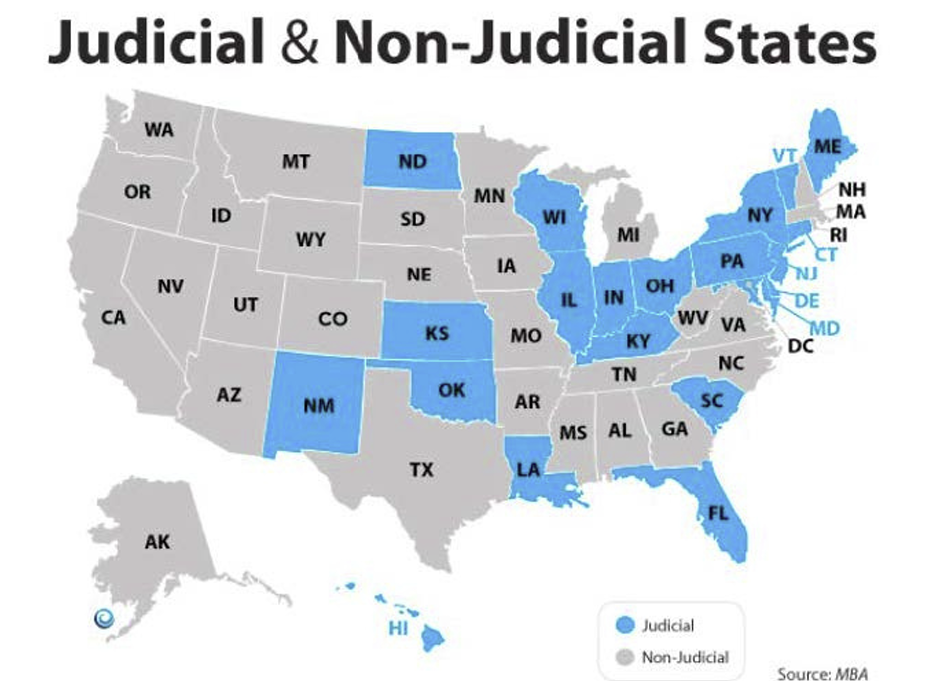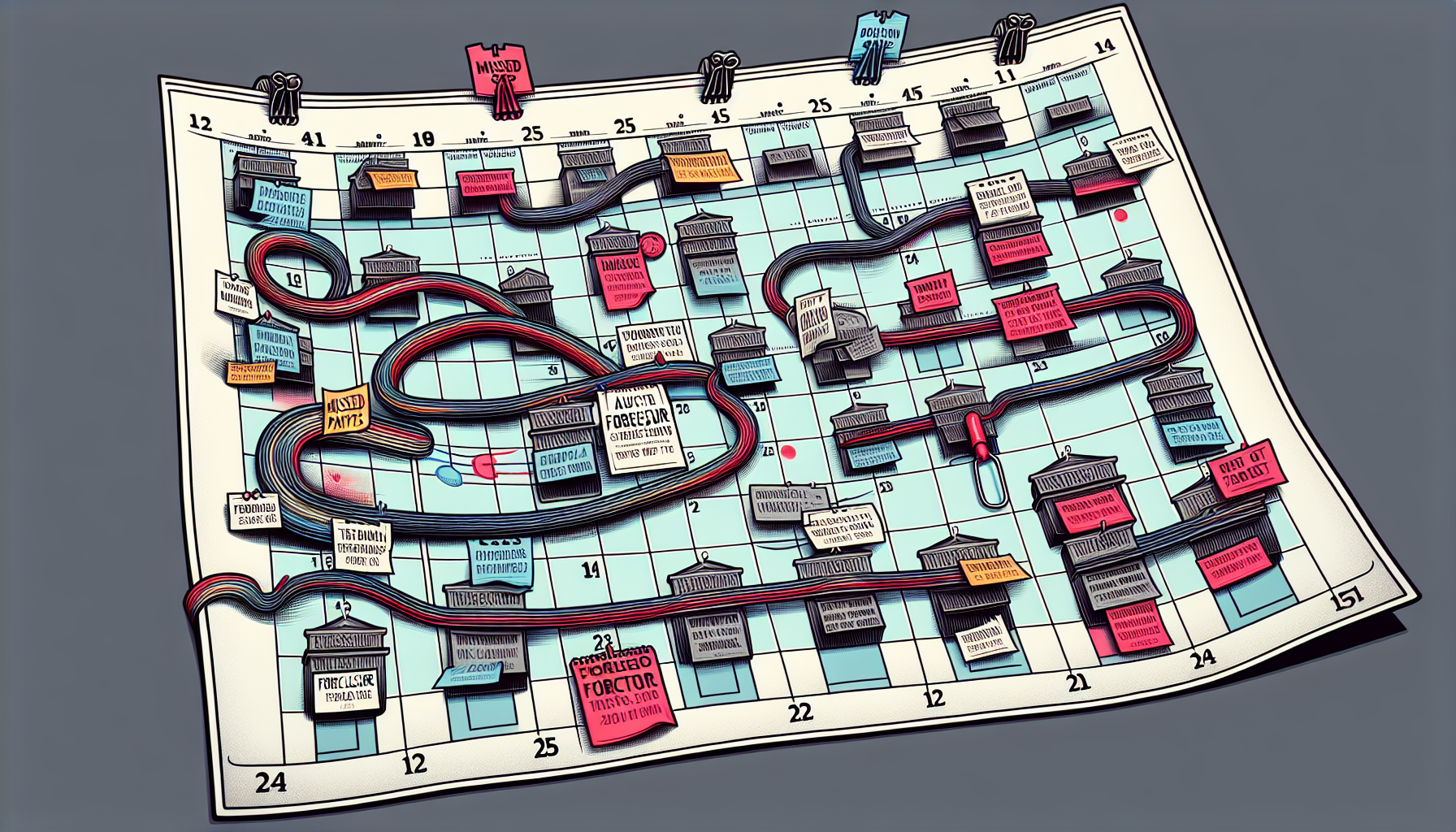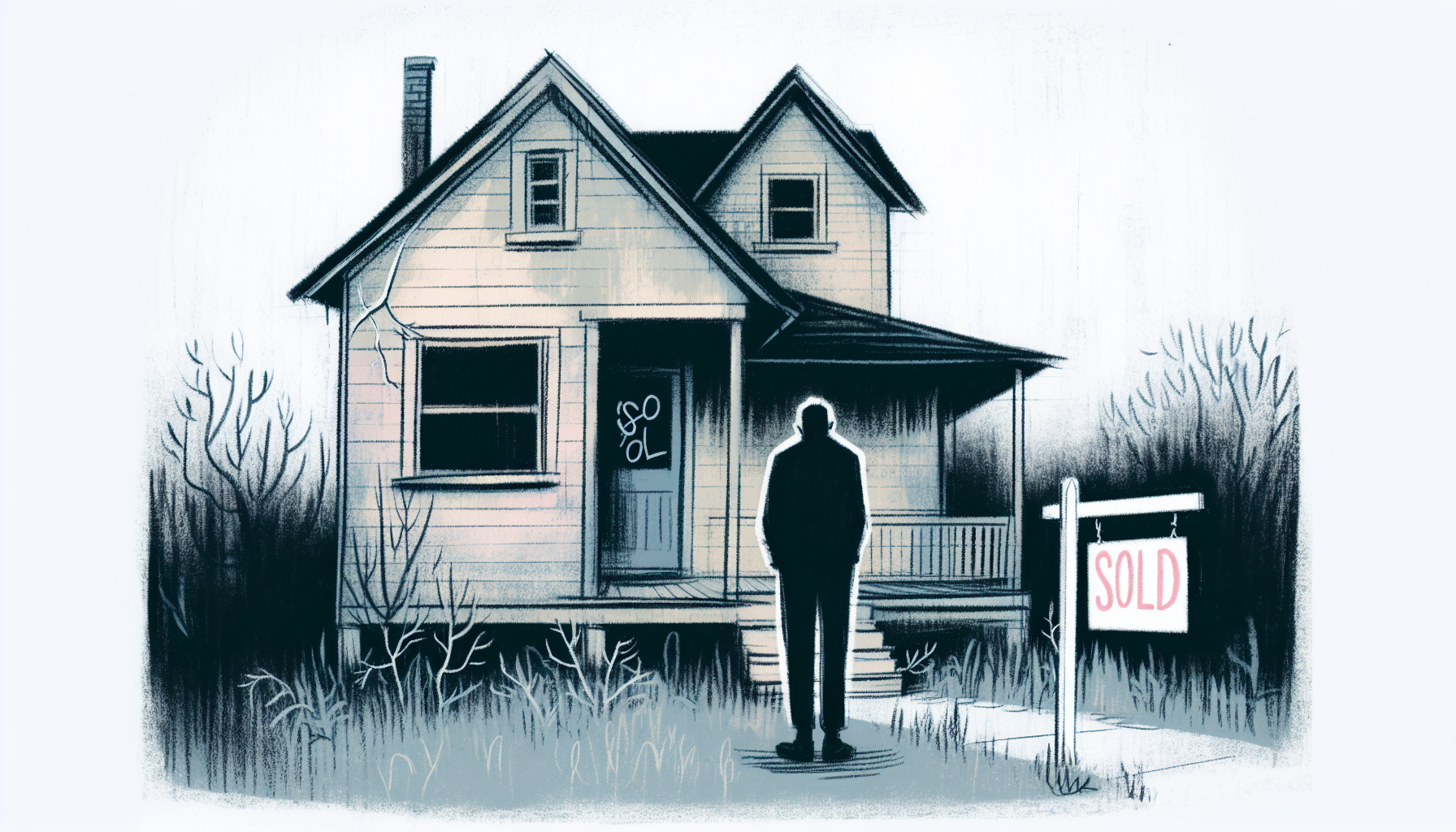Welcome to Capital Group
When Is It Too Late To Stop Foreclosure In My State?
Welcome to the premiere website for learning all about the foreclosure process and when is it too late to stop foreclosure? You have access to all the foreclosure state laws to learn how to stop foreclosure and if your state is a judicial or non-judicial foreclosure state. The rule of law is different and varies based on the state your property is located.
Find out the different laws to know when it is too late to stop foreclosure.
Foreclosure Prevention Strategies
Get Access to Private Home Buyers Who Buy Cash
We buy houses cash buyers is a proven last effort strategy that could stop foreclosure depending on the time to sell date.
Foreclosures Rules
Homeowners Options
Capital Group offers cash to home sellers in foreclosures nationwide.
Learn All About The Foreclosure Process and How It Works in your state to know when is it too late to stop foreclosure
Most homeowners have no idea when is it too late to stop foreclosure? We believe the more informed a homeowner is of their rights that they can make a wise decision that is in their best interest and possibly stop their home from going to foreclosure. At the very least they can do a rapid sell for a cash offer to prevent a foreclosure from going on their record and pocket some cash to hopefully get a new beginning that many of us have needed at some point in life.
How To Stop A Foreclosure?
1. Sell Your Home Speak with experienced real estate agents who are familiar with the home prices in your area so you can get an accurate market analysis. Although listing with a discount broker might sound like a reasonable way to save money, interview different agents and find one with strong marketing and sales experience. A discount broker will not save you money if they can’t sell the home before the foreclosure process ends.
2. Will Your Lender Consider a Short Sale If your home is worth less than what you owe on the loan, you might be a candidate for a short sale. Basically, your realtor will need to negotiate with the lender to see if they would be willing to take less than the full amount due on the loan. Keep in mind that this DOES affect your credit just as a foreclosure would and not all homes qualify for short sales.
3. Sign a Deed-in-Lieu of Foreclosure This essentially means the homeowner is signing the deed to the home back to the lender, thus closing out the loan and stopping foreclosure proceedings. Again, this affects one’s credit the same as a foreclosure would but you might even negotiate terms to stay in the home or rent the home for a lower price until the home is sold.
4. Chapter 13 Bankruptcy If these other avenues fail to stop the foreclosure, homeowners can file Chapter 13 bankruptcy which legally puts a stay on the foreclosure. At this point, all creditors are legally bound to stop their collection efforts, including selling the home in the foreclosure process. However, there are some exceptions and homeowners may still risk losing their homes but an attorney can help explain the legalities. Of course, if the lender won’t work with you and you’re unable to stay in the home…your options are a bit more limited… but there is still hope to save your credit rating, save you money, and get you out of your situation without hassle. We can evaluate your specific situation for you to lay it out in clear to understand terms exactly which options are realistic and exactly what each option can do for you and your family. Just get a hold of us and tell us a bit about your property… from there we’ll get back to you within 24 hours with a clear explanation of what will help you reach your goals in your specific situation.
The Foreclosure Process
The foreclosure process differs from state to state. Differences range from the notices that must be posted or
mailed, redemption periods, and the scheduling and notices issued regarding the auctioning of the property. In the
paragraphs that follow, you will find a outline of what to expect and how the process works along with a general
foreclosure timeline.
In general, mortgage companies start foreclosure processes about 3-6 months after the first missed mortgage
payment. Late fees are charged after 10-15 days, however, most mortgage companies recognize that homeowners
may be facing short-term financial hardships. Delinquent homeowners that stay in contact with their lender will
usually find that the lending institution is willing to work out some of the problems that they may be having.
Unfortunately, all too often, delinquent homeowners are embarrassed about what is happening and do not speak
with their lending institution until it is too late. After 30 days, the borrower is in default, and the foreclosure
processes begins to accelerate.
Three types of foreclosures may be initiated at the 30-day delinquent mark: judicial, power of sale, and strict
foreclosure. All types of foreclosure require public notices to be issued and all parties to be notified regarding the
proceedings. Once properties are sold through an auction, the former homeowner will have a small amount of time
to move out before the sheriff can issues an eviction.
When is it Too Late to Stop Foreclosure?
Understanding when it is too late to stop foreclosure is crucial for homeowners facing the threat of losing their property. The foreclosure process generally starts when a borrower defaults on their mortgage payments, typically after missing several consecutive payments. Once the lender initiates the foreclosure process, homeowners might wonder, “Can you stop a foreclosure?” The short answer is yes, but the options become more limited and complex as the process progresses.
One key point in the foreclosure timeline is the issuance of a lis pendens, a legal notice that a lawsuit has been filed concerning the property. Homeowners often ask, “Does lis pendens stop foreclosure?” While a lis pendens itself doesn’t halt the foreclosure, it signals that the property is subject to legal action, making it critical for the homeowner to act quickly to explore their options. During this period, homeowners might seek loans to stop foreclosure, which can help bring the mortgage current and potentially halt the process if done before the foreclosure sale date.
To stop foreclosures, various strategies can be employed depending on the stage of the foreclosure. Early in the process, options such as loan modification, refinancing, or even negotiating a repayment plan with the lender can be effective. However, as the foreclosure progresses towards a sale, these options become harder to achieve. For instance, once a property is scheduled for auction, the window to stop foreclosure narrows significantly. At this point, homeowners might need to consider more immediate solutions, such as filing for bankruptcy, which can temporarily halt the foreclosure process due to the automatic stay provision.
Ultimately, to find out when is it too late to stop foreclosure, one must understand the specific foreclosure laws in their state and keep close track of the timeline provided by their lender. In judicial foreclosure states, the process involves court proceedings, providing more opportunities for the homeowner to intervene. Non-judicial foreclosures, on the other hand, proceed without court involvement and can move much faster, limiting the homeowner’s time to act.
In summary, can you stop foreclosures? Yes, but it depends on the timing and the specific circumstances of the case. Early intervention is key. As soon as a homeowner realizes they are unable to keep up with mortgage payments, they should seek advice and explore options like loan modifications or refinancing to stop foreclosure. Once the process has advanced to the point of an auction date being set, options become more limited, and homeowners may need to consider drastic measures like bankruptcy to halt the process. Thus, knowing when it is too late to stop foreclosure is a matter of understanding the foreclosure timeline and acting swiftly to explore all available remedies.

High Return Investment Loans
Capital Group is excited to announce the High Yield 15% – 18% ROI for Real Estate Investment Notes that outperform REITs in Florida.
We’re the premier Lender for real estate investments. We believe you should be rewarded if you have a stronger investment and other components that offer less risk.
Investment Loans To Stop Foreclosure for Active Investors
As a real estate investor seeking higher return on investment deals you will need to find a private lender that will help you build your portfolio and who can close fast on more profitable real estate deals such as Capital Group.
Three Different Types of Foreclosures

Three types of foreclosures may be initiated at the 30-day delinquent mark: judicial, power of sale and strict
foreclosure. All types of foreclosure require public notices to be issued and all parties to be notified regarding
the proceedings. Once properties are sold through an auction, the former homeowner will have a small amount
of time to move out before the sheriff can issues an eviction.
1. Judicial Foreclosure. All states allow this type of foreclosure, and some require it. The lender files suit with
the judicial system, and the borrower will receive a note in the mail demanding payment. The borrower then
has 30 days to respond with a payment in order to avoid foreclosure. If a payment is not made after a certain
time period, the mortgaged property is then sold through an auction to the highest bidder, carried out by a local
court or sheriff’s office.
2. Power of Sale or Non-Judicial Foreclosure. This type of foreclosure, also known as statutory foreclosure,
is allowed by many states if the mortgage includes a power of sale clause. After a homeowner has defaulted
on mortgage payments, the lender sends out notices demanding payments. Once an established waiting
period has passed, the mortgage company, rather than local courts or sheriff’s office, carries out a public
auction. This normally takes place through a foreclosure trustee.
Non-judicial foreclosure auctions are often more expedient, though they may be subject to judicial review to
ensure the legality of the proceedings.
3. Strict Foreclosure. Two states, Connecticut and Vermont, allow this type of foreclosure. In strict
foreclosure proceedings, the lender files a lawsuit on the homeowner that has defaulted. If the borrower cannot
pay the mortgage within a specific timeline ordered by the court, the property goes directly back to the
mortgage holder. Generally, strict foreclosures take place only when the debt amount is greater than the value
of the property.
Judicial Foreclosure Process
What to Expect A judicial foreclosure is initiated with a lawsuit filed against the borrower, which typically includes a lis pendens and a demand for payment, as well as a request for a court order allowing you to sell the property.
The borrower is then served with a summons and given an opportunity to respond to the lawsuit.
If the borrower does not respond to the lawsuit or if the court rules your favor, the court will issue a judgment allowing you to sell the property to recoup the remaining balance of the mortgage.
The sale is typically conducted by a court-appointed auctioneer and the proceeds of the sale are used to pay off the outstanding debt, with any remaining funds going to the borrower.
Non-Judicial Foreclosure Process
What to Expect A notice of default and a notice of sale is sent to the borrower.
The borrower has a specified period to cure the default or to contest the foreclosure, after which you can proceed with the sale of the property. The sale is typically conducted by a trustee, rather than through a court proceeding.
You will need to rely on attorneys to help navigate the foreclosure process.
An attorney can assist you with drafting and filing the necessary legal documents, and advising you on compliance with state and federal laws regarding foreclosure.
The Foreclosure Process
Judicial Foreclosure Process
Uses State court system during foreclosure.
Homeowner carries the deed.
Default recorded at county courthouse.
Bank/Lender must go through courts before foreclosure can be initiated.
Court verifies default status, sends homeowner Lis Pendens notice.
In most states, the homeowner has 60 days at this stage in the process before home is sold at auction.
Non-Judicial Process
Uses Trustee to process foreclosure; courts not required.
Beneficiary (investor) carries the deed.
Default recorded at county Recorder's office.
Bank/Lender does not have to go through courts to initiate foreclosure process.
Trustee notifies owner of legal action through Notice of Default followed by Notice of Trustee Sale notification.
In most states, homeowner has 22 - 30 days at this stage in the process before home is sold at public auction.
State Foreclosure Laws and Timelines To Stop Foreclosure
| State | Judicial | Non-Judicial | Foreclosure Timeline | Redemption Period | Deficiency Judgement | State Website Laws |
|---|---|---|---|---|---|---|
| Alabama | X | X | 1 - 3 Months | Up to 12 Months | Yes (Judicial) | Stop Foreclosure Alabama |
| Alaska | X | X | 3 - 4 Months | None | Yes (Judicial) | |
| Arizona | X | X | 3 - 4 Months | Up to 6 Months | Yes (Judicial) | |
| Arkansas | X | X | 4 - 5 Months | Up to 12 Months | Yes | |
| California | X | X | 3 - 5 Months | Not Likely | Yes (Judicial) | |
| Colorado | X | X | 2 - 5 Months | None | Yes | |
| Connecticut | X | 5 - 6 Months | Court Determined | Yes | ||
| Delaware | X | 3 - 7 Months | None | Yes | ||
| District of Columbia | X | 2 - 4 Months | None | Yes | ||
| Florida | X | 4 - 6 Months | Yes | Yes | Stop Foreclosure Florida | |
| Georgia | X | X | 2 - 3 Months | None | Yes | Stop Foreclosure Georgia |
| Hawaii | X | X | 3 - 4 Months | None | Yes | |
| Idaho | X | X | 5 - 6 Months | None | Yes | |
| Illinois | X | 7 - 10 Months | Yes 3 -7 Months | Yes | ||
| Indiana | X | 5 - 7 Months | None | Yes | ||
| Iowa | X | X | 5 - 6 Months | 12 Months | Yes | |
| Kansas | X | 3 - 5 Months | Up to 12 Months | Yes | ||
| Louisiana | X | 2 - 6 Months | None | Yes | ||
| Maine | X | 6 - 10 Months | 90 Days | Yes | ||
| Maryland | X | 2 - 3 Months | Court Determined | Yes | ||
| Massachusetts | X | 3 - 4 Months | None | Yes | ||
| Michigan | X | 2 - 3 Months | Up to 12 Months | Yes | ||
| Minnesota | X | X | 2 - 3 Months | 6 Months | Yes (Judicial) | |
| Mississippi | X | X | 2 - 3 Months | None | Yes | |
| Missouri | X | X | 2 - 3 Months | Up to 12 Months | Yes | |
| Montana | X | X | 4 - 6 Months | 12 Months | Yes (Judicial) | |
| Nebraska | X | 5 - 6 Months | None | Yes | ||
| Nevada | X | X | 3 - 5 Months | None | Yes | |
| New Hampshire | X | 2 - 3 Months | None | Yes | ||
| New Jersey | X | 3 - 10 Months | 6 Months | Yes | ||
| New Mexico | X | 4 - 6 Months | 9 Months | Yes | ||
| New York | X | 4 - 8 Months | None | Yes | ||
| North Carolina | X | X | 2 - 4 Months | 10 Days | Yes (Judicial) | Stop Foreclosure North Carolina |
| North Dakota | X | 3 - 5 Months | 60 Days | No | ||
| Ohio | X | 5 - 7 Months | Until Confirmation | Yes | ||
| Oklahoma | X | X | 4 - 7 Months | Until Confirmation | Yes | |
| Oregon | X | X | 4 - 6 Months | None | No | |
| Pennsylvania | X | 3 - 9 Months | None | Yes | ||
| Rhode Island | X | X | 2 - 3 Months | Up to 3 Years | Yes | |
| South Carolina | X | 4 - 7 Months | None | Yes | ||
| South Dakota | X | X | 6 - 9 Months | Up to 12 Months | Yes | |
| Tennessee | X | 2 - 3 Months | Up to 2 Years | Yes | ||
| Texas | X | X | 2 - 3 Months | None | Yes | |
| Utah | 4 - 5 Months | 180 Days | Yes | |||
| Vermont | X | 7 - 10 Months | Up to 6 Months | Yes | ||
| Virginia | X | X | 2 - 3 Months | None | Yes | |
| Washington | X | X | 4 - 5 Months | 8 or 12 Months (Judicial) | Yes (Judicial) | |
| West Virginia | X | 2 - 3 Months | None | Yes | ||
| Wisconsin | X | X | 6 - 10 Months | None | Yes | |
| Wyoming | X | X | 2 - 3 Months | 3 Months | Yes | |

The Pre Foreclosure Notice Process Up to Foreclosure Auction Sale: Do You Have Time?
Timeline varies by state. Navigate the foreclosure process, discover all of your options, find the solution or solutions that may help you stop or avoid your foreclosure, and gain control over your foreclosure situation from here on out.
- First month missed payment – your lender will contact you by letter or phone. A mortgage housing counselor can help.
- Second month missed payment – your lender is likely to begin calling you to discuss why you have not made your payments. It is important that you take their phone calls. Talk to your lender and explain your situation and what you are trying to do to resolve it. At this time, you still may be able to make one payment to prevent yourself from falling three months behind. A mortgage housing counselor can help.
- Third month missed payment after the third payment is missed, you will receive a letter from your lender stating the amount you are delinquent, and that you have 30 days to bring your mortgage current. This is called a “Demand Letter” or “Notice to Accelerate.” If you do not pay the specified amount or make some type of arrangements by the given date, the lender may begin foreclosure proceedings. They are unlikely to accept less than the total due without arrangements being made if you receive this letter. You still have time to work something out with your lender. A cash house buyer investor can still help.
- Fourth month missed payment – now you are nearing the end of time allowed in your Demand or Notice to Accelerate Letter. When the 30 days ends, if you have not paid the full amount or worked our arrangements you will be referred to your lender’s attorneys. You will incur all attorney fees as part of your delinquency. A cash house buyer can still help you possibly.
- Sheriff’s or Public Trustee’s Sale – the attorney will schedule a Sale. This is the actual day of foreclosure. You may be notified of the date by mail, a notice is taped to your door, and the sale may be advertised in a local paper. The time between the Demand or Notice to Accelerate Letter and the actual Sale varies by state. In some states it can be as quick as 2-3 months. This is not the move-out date, but the end is near. You have until the date of sale to make arrangements with your lender, or pay the total amount owed, including attorney fees.
- Redemption Period – after the sale date, you may enter a redemption period. You will be notified of your time frame on the same notice that your state uses for your Sheriff’s or Public Trustee’s Sale.
Important: Stay in contact with your lender, and get assistance as early as possible. All dates are estimated and vary according to your state and your mortgage company.

When Is It Too Late to Stop Foreclosures: Facing Foreclosure?
Wondering “when is it to late to stop foreclosures?” is a critical concern for any homeowner facing this daunting process. The pivotal moment typically comes just before the auction date, but this isn’t a one-size-fits-all answer. Your ability to prevent foreclosure can hinge on several factors, including state laws and the specific circumstances of your case. This guide dives into the foreclosure timeline, demystifying key milestones and exploring the preventive measures available at each stage, so you understand exactly when and how you can still take control.
Key Takeaways
- Foreclosure is a sequential legal process starting with missed payments and potentially leading to auction, with federal law stipulating a minimum 120-day delinquency before initiating foreclosure.
- Homeowners have several mitigation options to prevent foreclosure, such as loan modifications, forbearance agreements, and repayment plans, which need early action to be effective.
- Understanding state-specific foreclosure laws, maintaining communication with lenders, and seeking assistance from HUD-approved housing counselors are crucial steps in managing and preventing foreclosure.
Understanding the Foreclosure Timeline
Foreclosure is a legal process initiated by the lender when a homeowner can no longer make their mortgage payments. It’s a journey that starts with the initial missed payments, moves through pre-foreclosure phase, and culminates in an auction date. The key is that the foreclosure process does not begin immediately after a missed payment. Federal law mandates that homeowners must be more than 120 days overdue on their mortgage payments before the foreclosure process can begin.
Recognizing the early signs of foreclosure is the first step towards avoiding it. Here are the key milestones to watch out for:
- The mortgage goes into default one day after the due date for the payment has passed.
- After 45 days of being in default, the lender will usually send a Notice of Intent to Foreclose and a loss mitigation application.
- If the lender decides to proceed with foreclosure, they can file an Order to Docket with the lender’s law firm after 90 days of being in default.
Initial Missed Payments: The Early Warning Signs
Missing a few mortgage payments is the first signal that foreclosure could be on the horizon. What’s crucial is how you respond to these missed payments. Ignoring lender communications such as letters, emails, and phone calls can lead to missed opportunities to rectify the situation and avoid foreclosure.
When you receive a breach letter from the lender—an official notice of default—it’s critical to act immediately. This letter provides a time frame to rectify missed payments before the loan balance is accelerated. Don’t panic; instead, seize the opportunity to engage with your lender and discuss potential solutions. Showing your intention to address the issue and initiating contact with the lender can open up foreclosure prevention options, including:
- mortgage modification
- forbearance
- repayment plan
- short sale
- deed in lieu of foreclosure
Pre-Foreclosure and Notice of Default
The pre-foreclosure process marks a significant shift in your foreclosure journey. It begins with the receipt of a Notice of Default, which is a formal declaration that you’re behind on your mortgage payments. This is a critical stage, as it’s your official notice that foreclosure proceedings are in motion, and it’s time to take action to avoid foreclosure.
Homeowners are entitled to notification of the initiation of foreclosure proceedings, which may take the form of a summon and complaint or a notice of default. Before a lender can begin the foreclosure process, the mortgage loan must be delinquent for at least 120 days. This period provides a window of opportunity for you to contact your lender, discuss your financial situation, and explore possible solutions such as loan modification, short sale, or possibly filing for bankruptcy.
Auction Date: The Point of No Return
The foreclosure sale date is the point of no return. It’s the final deadline in the foreclosure process, signifying the point at which your options to halt the procedure are drastically diminished or extinguished. At this stage, the house will be auctioned off to the highest bidder, and your home ownership rights will be terminated.
Neglecting financial difficulties and delayed response to mortgage troubles increase the risk of reaching this point, with limited recourse to reinstate the loan or save the property.
Legal and Lender Deadlines
Understanding legal and lender deadlines in the foreclosure process is crucial to defending your home. These deadlines can influence your options and determine the timeline of the foreclosure.
Homeowners have the right to reinstate their default mortgage by paying all overdue payments and fees up to one business day before the scheduled foreclosure sale. This is known as the right of redemption, which permits homeowners, depending on the state, to either pay off the full mortgage amount before the foreclosure sale or reimburse the buyer afterward to regain ownership.
Some states offer a right to reinstatement, which allows homeowners to restart the loan by paying all overdue amounts and penalties in a single payment within a predefined time frame. Homeowners should obtain lender approval before making a lump-sum payment to reinstate a mortgage. This step is important to ensure that the payment is accepted and the mortgage is reinstated..
Loss mitigation efforts, like filing the final loss mitigation affidavit, must be completed at least 30 days before the foreclosure sale. In some states, it’s too late to stop a foreclosure after the lender auctions off the home, though certain jurisdictions may offer a post-auction redemption period.
Understanding Your State’s Foreclosure Laws
State-specific foreclosure laws can greatly impact the foreclosure timeline and the rights you have as a homeowner. These laws dictate the procedures that mortgage lenders must follow, and they differ from state to state. For instance, some states offer homeowners the right to reinstate their loan before the foreclosure is finalized.
Understanding these laws is crucial to navigating the foreclosure process and protecting your rights. Your mortgage documents are a valuable resource for understanding these laws. It’s important to read these documents thoroughly to understand what actions your lender could take in case of non-payment.
Mortgage Servicer’s Discretion
The role of mortgage servicers in the foreclosure process is pivotal. As a mortgage lender, these entities manage mortgage loans, including collecting and tracking payments. They’re also obliged under federal law to assist delinquent borrowers in getting back to good standing with their mortgage loans.
Mortgage servicers can exercise discretion in how they handle foreclosure. They can offer you options such as a repayment plan, loan modification, or short sale. They’re also responsible for providing you with a loss mitigation application and a Notice of Intent to Foreclose when you are 45 days overdue on your mortgage payments. It’s important, therefore, to maintain open communication with your mortgage servicer throughout the foreclosure process.
Loss Mitigation Options to Halt Foreclosure
When you’re struggling to make your mortgage payments, don’t lose hope. There are several loss mitigation options that could help you halt the foreclosure process. This can include loan modifications, forbearance agreements, or establishing a repayment plan.
Loan modifications, for instance, can help by reducing the interest rate, forgiving some of the principal, or waiving fees and penalties, thus making monthly payments more affordable. Forbearance agreements temporarily pause mortgage payments during financial hardship, although they are not permanent solutions. After a forbearance period, a repayment plan may become available, allowing homeowners to catch up on missed payments over a set time, usually less than six months.
Additional alternatives to avoid foreclosure may include the state-dependent mediation process which provides an opportunity to negotiate with the lender.
Loan Modification: Adjusting Your Mortgage Terms
Loan modification is a potential lifeline for homeowners facing foreclosure. It involves adjusting the terms of your mortgage to make the payments more manageable. This could mean reducing the interest rate, which can significantly lower your monthly mortgage payments, or extending the term of your mortgage, which spreads the balance over more payments, leading to smaller monthly payments.
In addition to these measures, loan modifications can include eliminating mortgage insurance and seeking lower homeowners insurance rates. Appealing property taxes can also reduce overall monthly mortgage expenses. These adjustments can help you stay current with your mortgage payments and avoid foreclosure.
Forbearance Agreements: Temporary Relief
Forbearance agreements offer a temporary pause of mortgage payments during times of financial hardship. They provide a respite, allowing you to get back on your feet financially. By pausing mortgage payments, forbearance agreements can delay the foreclosure process, providing temporary relief to the homeowner.
However, it’s important to note that forbearance agreements are not a permanent solution. Following the forbearance period, you’ll need to repay the missed payments, either through a repayment plan or in a lump sum. But, in the short term, a forbearance agreement can provide the breathing room you need to reorganize your finances and explore other loss mitigation options.
Repayment Plans: Catching Up on Missed Payments
If you’ve fallen behind on your mortgage payments, a repayment plan could be a viable option. A mortgage repayment plan allows you to:
- Pay off missed mortgage payments over time
- Set up a schedule to catch up on payments
- Avoid foreclosure Repayment plans are particularly suitable for situations where you’ve experienced a temporary financial setback such as a job loss or medical emergency.
With a repayment plan, missed payment amounts are distributed across future monthly payments, eliminating the need for a large lump-sum payment. This can make it more manageable for homeowners to catch up on their mortgage payments and avoid foreclosure. However, it’s essential to negotiate repayment plans as soon as possible after a financial setback to prevent foreclosure.
When It’s Too Late: Post-Foreclosure Actions
While it’s best to take action before foreclosure, sometimes circumstances mean that homeowners can’t avoid it. But even after foreclosure, you still have options. You can file exceptions with the Circuit Court after the foreclosure sale and before the sale is ratified to challenge the sale. This can be a complex process, but it is an option for regaining title to the home.
If there’s a surplus after the foreclosure sale, the court auditor will review and recommend appropriate distribution of the proceeds. However, once the foreclosure sale has taken place, the new property owner must file a Motion for Entry of Judgment Awarding Possession and deliver an eviction notice to evict the former homeowner.
Challenging the Foreclosure Sale
Challenging a foreclosure sale is a possible post-foreclosure action. You can contest the foreclosure if there are:
- Errors made by the mortgage servicer
- Failure to adhere to state laws or mortgage terms
- Insufficient notice
- Issues such as invalid mortgage assignment
To successfully challenge a foreclosure sale based on technical errors, you must show actual harm. This could include a deficiency judgment that resulted from a lowered sale price due to lender violations. A foreclosure sale may also be set aside if the sale price is shockingly low, influenced by factors such as irregular sale timing or deviations from the scheduled sale process.
If you can prove lender fraud, you may be eligible for additional damages beyond standard financial losses incurred.
Seeking Damages After Foreclosure
In the aftermath of a foreclosure, homeowners may have the option to seek damages if there were flaws during the foreclosure process, such as noncompliance with legal procedures or the property being sold for an unreasonably low price.
To successfully claim damages for wrongful foreclosure, you must prove that the sale process had irregularities resulting in your financial harm. Damages awarded are often the difference between the home’s market value at the time of foreclosure and the outstanding loan balance. This can provide some financial relief following the foreclosure process.
Proactive Measures to Prevent Future Foreclosures
Preventing future foreclosures requires a proactive approach. This includes staying current with mortgage payments, building a financial safety net, consulting with housing counselors, and monitoring your credit report.
The best way to avoid foreclosure is by:
- Consistently making your mortgage payments on time. This will help ensure that you keep up with your financial obligations and maintain ownership of your property.
- Prioritizing monthly mortgage payments to prevent the onset of foreclosure.
- Building an emergency fund to provide crucial financial support in the event of unexpected hardships, such as job loss, thereby helping to prevent foreclosure.
- Seeking free expert advice and loss mitigation counseling from HUD-sponsored housing counseling agencies to assist homeowners in avoiding foreclosure.
Staying Current with Mortgage Payments
Staying current with your mortgage payment is the first line of defense against foreclosure. Prioritizing spending is crucial for homeowners, with mortgage payments being the top priority over other financial obligations, including mortgage debt, to prevent the initiation of foreclosure proceedings.
Effectively managing your finances is key to staying current with your mortgage payments. This includes incorporating savings into your spending plans as a regular expense, ensuring that mortgage payments can be made on time consistently. This consistent, on-time payment of your mortgage can help you avoid the stress and financial hardship of foreclosure.
Building a Financial Safety Net
Building a financial safety net is crucial to weathering financial storms and keeping up with mortgage payments. Initiating an emergency fund may involve methods such as cutting expenses or increasing income, and even small savings contributions can accumulate over time.
Even small actions like depositing loose change daily into a jar and periodically moving it to a savings account can be an effective strategy to build emergency savings. Utilizing assets such as selling a second vehicle or jewelry, or acquiring additional employment within the household, can provide funds to help maintain mortgage payments.
Consulting with Housing Counselors
Consulting with housing counselors can provide invaluable guidance for homeowners. HUD-approved housing counselors assist homeowners in comprehending foreclosure laws and exploring available options for their situation. These counselors are equipped to assist with negotiating with lenders, providing a valuable service for at-risk homeowners. It’s important to confirm that housing counselors work for a HUD-approved agency to ensure legitimate and trustworthy assistance. Keep in mind that while foreclosure prevention services can sometimes come with fees, HUD-approved housing counselors provide similar services without charge.
Summary
Facing foreclosure can be a daunting experience, but armed with knowledge and a proactive approach, you can navigate this challenging process. By understanding the foreclosure timeline, legal and lender deadlines, and proactive measures to prevent future foreclosures, you can take control of your financial future. Remember, assistance is available, and you don’t have to face foreclosure alone. It’s your home, and it’s worth fighting for.
Frequently Asked Questions
What is foreclosure?
Foreclosure is a legal process where a lender repossesses a home from a homeowner who can no longer make mortgage payments, in order to sell it and cover some of the owed debt.
What is a loan modification?
A loan modification is a way to adjust the terms of a mortgage to make payments more manageable, potentially by reducing the interest rate, forgiving part of the principal, or waiving fees and penalties. It helps borrowers avoid foreclosure and stay in their homes.
What is a forbearance agreement?
A forbearance agreement is a temporary pause on mortgage payments during financial hardship, helping to delay foreclosure and provide relief to the homeowner.
Can I challenge a foreclosure sale?
Yes, homeowners have the right to challenge a foreclosure in cases of errors by the mortgage servicer, failure to follow state laws or mortgage terms, insufficient notice, or invalid mortgage assignment. Therefore, it’s important to review the details and seek legal advice if needed.
How can I prevent future foreclosures?
To prevent future foreclosures, take a proactive approach by staying current with mortgage payments, building a financial safety net, and seeking advice from housing counselors. These steps can help protect your home from foreclosure in the future.
Serving Real Estate Investors & Business Owners
Business Industries
Countries


Get Started
Find The Private Money For Real Estate & Business
Rehab Fix & Flip Loans
Fix and Flip loans are short-term, small-business loans that real estate investors utilize to purchase and renovate investment properties for resale that we like to call After Repair Value (ARV) which is a force appreciation strategy.
Bridge Loans & Term Loans
Bridge Loans are short-term financing investment loans which are used until the investor secures permanent financing and it’s mostly used for immediate cash flow to acquire the real estate assets. Some investors exit strategy is to sell.
Ground-UP Construction Loans
Ground-Up construction loans typically have project costs and need cash reserves. Development experience is required. We offer programs for a single home or an entire development.
Business Financing
We offer Business Loans with a variety of business financing programs that will get you the funding for your business. We offer over loans from $5,000 – $100 Million.
Foreclosure Timeline
How to Stop a Foreclosure Before It’s too late
Facing foreclosure can be an overwhelming experience for any homeowner. Understanding your options and acting quickly can make a significant difference. This article will guide you through various strategies to stop a foreclosure, using specific keywords to address all aspects of this challenging situation.
Understanding Foreclosure Types
- Tax Lien Foreclosure: This occurs when unpaid property taxes lead the local government to place a lien on your property, eventually resulting in foreclosure if not addressed.
- Mortgage Foreclosure: This is the process initiated by your mortgage lender when you default on your mortgage payments.
- Real Estate Tax Lien Foreclosure: Similar to tax lien foreclosure, this involves unpaid real estate property taxes leading to foreclosure.
- Property Tax Lien Foreclosure: When property taxes remain unpaid, this can trigger a lien and subsequent foreclosure.
- Property Mortgage Foreclosure: This is specifically related to defaulting on mortgage payments for a property.
- Real Estate Mortgage Foreclosure: A broader term encompassing foreclosure due to mortgage defaults on real estate properties.
Immediate Steps to Stop Foreclosure
- Contact Your Mortgage Company: If you are facing foreclosure, the first step is to contact your mortgage company. They may offer solutions like a payment plan or loan modification.
- File for Bankruptcy: Filing for Chapter 13 bankruptcy can provide an automatic stay, halting the foreclosure process and allowing you to reorganize your debts.
- Seek a Free Consultation with a Law Firm: A real estate law firm or investment property law firm can provide legal advice on how to stop foreclosure and may offer a free consultation.
Legal and Financial Considerations
- Legal Fees and Marketing Fees: Be prepared for potential legal and marketing fees when dealing with foreclosure. A law firm can help outline these costs.
- Stop Foreclosure Auction: If your property is set for a foreclosure auction, acting quickly to stop the foreclosure auction is crucial.
- Delinquency Notice: Respond promptly to any delinquency notice from your mortgage lender to explore your options.
- Late Fees and Back Payments: Addressing late fees and back payments can help stop the foreclosure process.
Strategies to Prevent Foreclosure
- Payment Plan: Setting up a payment plan with your mortgage lender can help you catch up on missed payments.
- Borrowing Money: Borrowing money from family, friends, or a financial institution can help you cover overdue payments.
- Selling Your Home: Selling your home before the foreclosure date can help you pay off the mortgage and avoid foreclosure.
- Redemption Period: Some states offer a redemption period after the foreclosure sale, allowing you to reclaim your property by paying the full amount owed.
- Short Sale: Negotiating a short sale with your lender can prevent foreclosure by selling the property for less than the mortgage balance.
Understanding State Laws and Procedures
- Non-Judicial Foreclosure States: In these states, the foreclosure process does not require court approval, making it faster and more streamlined.
- Court System and Default Judgment: In judicial foreclosure states, the lender must go through the court system to get a default judgment to proceed with foreclosure.
- State Law: State laws vary widely, so understanding the specific foreclosure laws in your state is essential.
Avoiding Foreclosure in the Future
- Keep Up with Mortgage Payments: Ensuring timely mortgage payments is the best way to avoid foreclosure.
- Manage Property Taxes: Stay current on your real estate property taxes and property taxes to prevent tax lien foreclosure.
- Regular Communication with Your Lender: Keep an open line of communication with your mortgage lender to address any financial difficulties early on.
- Explore Government Assistance Programs: There are various government programs designed to help homeowners facing foreclosure.
Conclusion
Stopping foreclosure requires immediate action and a clear understanding of your options. Whether you are dealing with tax lien foreclosure, mortgage foreclosure, or real estate tax lien foreclosure, there are steps you can take to save your home. Contacting your mortgage lender, seeking legal advice, and exploring financial solutions are all crucial steps in the process. With the right approach and timely action, you can stop the foreclosure process and secure your financial future.
If you are facing foreclosure, don’t wait until it’s too late to stop foreclosure. Reach out to a law firm for a free consultation, understand your state’s laws, and take proactive steps to protect your home and your financial well-being.
How To Stop Foreclosure Proceedings
Foreclosure proceedings can be a daunting and stressful experience for any property owner. When you receive a pre-foreclosure notice, it’s crucial to act swiftly. Here’s a guide on how to stop foreclosure proceedings and save your home.
Understanding Foreclosure Proceedings
Foreclosure begins when the mortgage lender sends a formal notice of missed payments. The first missed payment typically triggers a delinquency notice, and repeated missed payments result in a foreclosure notice. The lender sends this notice to the property owner, marking the start of the foreclosure process.
Immediate Actions to Stop Foreclosure
- Contact Your Mortgage Company: Reach out to your mortgage lender immediately after receiving a foreclosure notice. Most lenders prefer to avoid foreclosure due to the associated legal and marketing fees.
- Loan Modification Programs: Inquire about loan modification programs. These programs can adjust your mortgage terms, making payments more manageable.
- Payment Plans: Negotiate a payment plan to catch up on missed payments. This plan might include paying back payments over a certain period while keeping up with your current mortgage payments.
- Housing Counselor: Seek help from a HUD-approved housing counselor. They can provide free consultation and assist with understanding your options.
- Borrowing Money: If possible, borrow money from family, friends, or other sources to cover missed payments and prevent foreclosure.
Legal Actions to Delay or Stop Foreclosure
- File for Bankruptcy: Filing for Chapter 13 bankruptcy can immediately stop foreclosure proceedings. This option activates an automatic stay, preventing the lender from continuing foreclosure actions. In most cases, Chapter 13 allows you to catch up on payments over three to five years.
- Legal Fees: Be aware that legal fees can accrue, so consult with a foreclosure attorney to understand the costs involved and how they can help stop the foreclosure.
- State Law: Check your state’s foreclosure laws. Some states, known as non-judicial foreclosure states, do not require court approval for foreclosure, while others do.
- Foreclosure Auction and Redemption Period: If your home is sold at a foreclosure auction, some states offer a redemption period during which you can reclaim your home by paying the entire balance and any remaining taxes and fees.
Alternative Solutions
- Sell the Property: If keeping the home is not feasible, selling it with the help of a real estate agent might be a viable option. A timely sale can pay off the mortgage and potentially avoid a foreclosure on your credit record.
- Short Sale: Negotiate a short sale with your lender, allowing you to sell the home for less than the mortgage balance. This option might still impact your credit but can prevent a foreclosure.
- Deed in Lieu of Foreclosure: This process involves voluntarily transferring the property title to the lender. It can stop foreclosure and avoid the long-term damage to your credit that a foreclosure would cause.
Avoiding Future Foreclosure
- Stay Current on Payments: Make your mortgage payment a priority to avoid missed payments and late fees.
- Budgeting and Saving: Create a budget that allows for saving money for emergencies, including potential future missed payments.
- Communicate with Your Lender: Keep open communication with your lender, especially if your financial situation changes. They may offer options to help you stay on track.
Conclusion
While stopping foreclosure can be challenging, understanding your options and taking immediate action can significantly improve your chances of keeping your home. If you find yourself in this situation, don’t hesitate to seek professional advice and take advantage of the resources available to you.
For personalized assistance, contact today for a free consultation. Remember, in most cases, taking early action can make a significant difference in stopping foreclosure proceedings and saving your home.
How To Find Private Money Lender With A Private Money Lender Portal?
Navigating the landscape of private financing requires a deep understanding of where to find a “private money lender near me.” This journey can significantly impact your ability to secure funding for investment endeavors, particularly in real estate. Private money lenders, distinct from conventional banking institutions, offer a pathway to funds that might otherwise be inaccessible. This comprehensive guide aims to illuminate the process of finding a private money lender near you, ensuring that your investment projects, whether they are centered on real estate or other ventures, have the financial backing they need to flourish.
Business Loan Types

Equipment Financing Loans
Equipment financing is a type of loan that enables small businesses to purchase the equipment and machinery needed to conduct business and grow their company.
Accounts Receivable Financing
Accounts receivable financing is a type of financing arrangement which is based on a company receiving financing capital in return for a chosen portion of its accounts receivable.
Factoring Financing
Factoring functions similarly to a credit card where the bank or lender (factor) is buying the debt of the customer without recourse to the seller. It is used to get cash quickly.
Merchant Financing
A merchant cash advance is a type of loan financing for small businesses that need capital immediately to cover cash-flow shortages.
Business Line of Credit
A business line of credit is a revolving form of small business funding that operates similar to a credit card that only charges interest on the amount you use of the line of credit.
SBA Loans
SBA loans are guaranteed by the Small Business Administration (SBA) and range from small to large loans which can be used for most business purposes.

Leadership Team Since 1991
Years in Business
Clients
$ Loans
We provide commercial loans for business owners and commercial real estate loans with our private capital. We also have access to 3,000 plus lenders who compete for your business, which allows us to offer you low competitive rates and save time in raising the capital needed for your venture. Our clients are offered loans for Commercial Real Estate Loans, Asset Based Loans, Working Capital Loans, Equipment Lease Loans, Factoring, Trade Financing, Hard Money Loans, Merchant Financing, Small Business Administration Loans (SBA), Structured Financing, Unsecured Lines of Credit.
Capital Group Top Return On Investments
Foreclosure Frequently Asked Questions
-
What is foreclosure?
Foreclosure is the legal process by which a lender takes possession of a property when the borrower fails to make mortgage payments.
-
How does the foreclosure process start?
The foreclosure process begins when a borrower defaults on their mortgage payments, typically after missing several payments, and the lender files a notice of default.
-
Can I stop a foreclosure once it starts?
Yes, there are several ways to stop a foreclosure, including reinstating the loan by paying the overdue amount, negotiating a loan modification, or filing for bankruptcy.
-
What are the different types of foreclosure?
The main types of foreclosure are judicial foreclosure, where the process goes through the courts, and non-judicial foreclosure, which is handled outside of court.
-
How long does the foreclosure process take?
The timeline for foreclosure varies by state and the specific circumstances of the case, but it can take anywhere from a few months to over a year.
-
What happens to my credit score if my home is foreclosed?
A foreclosure can significantly impact your credit score, typically lowering it by 100 to 160 points and remaining on your credit report for seven years.
-
Can I sell my home to avoid foreclosure?
Yes, selling your home before the foreclosure process is completed can help you avoid the negative impact on your credit score and possibly preserve some equity.
-
What is a short sale?
A short sale occurs when the lender allows the homeowner to sell the property for less than the outstanding mortgage balance to avoid foreclosure.
-
Will I owe money after a foreclosure?
This depends on the state and the specific terms of your mortgage. Some states have laws that protect borrowers from owing a deficiency balance, while others allow lenders to pursue the remaining balance.
-
Can I buy another home after a foreclosure?
Yes, but it may take time to rebuild your credit. Lenders typically require a waiting period of three to seven years before approving a new mortgage after a foreclosure.
-
What is a deed in lieu of foreclosure?
A deed in lieu of foreclosure is an agreement where the homeowner voluntarily transfers the property deed to the lender to avoid the foreclosure process.
-
How can I avoid foreclosure?
To avoid foreclosure, communicate with your lender as soon as you anticipate trouble making payments. Options include loan modification, refinancing, forbearance, and financial counseling.
-
Are there government programs to help avoid foreclosure?
Yes, programs such as the Home Affordable Modification Program (HAMP) and the Home Affordable Refinance Program (HARP) have been created to help homeowners avoid foreclosure.
-
What rights do I have during the foreclosure process?
Homeowners have the right to receive notice of the foreclosure, the right to challenge the foreclosure in court, and the right to be treated fairly by the lender throughout the process.
Understanding the Dynamics of Private Money Lending: A Comprehensive Guide
In the complex landscape of real estate investing, individuals often seek alternative financing solutions to fund their projects, and private money lending has emerged as a viable option. Private money loans, offered by private money lenders, have become a crucial resource for many real estate investors looking to secure funding outside traditional financial institutions. This article delves deep into the intricate workings of private money lending, exploring its nuances, benefits, and potential pitfalls.
The Role of Private Money Lenders
Private money lenders play a pivotal role in the real estate investing business. These entities, often individuals or private lending companies, offer private money loans to borrowers for various purposes, such as purchasing investment properties, funding construction projects, or supporting real estate development ventures.
Local Private Money Lender Near Me
Seeking a Private Money Lender Near Me
When embarking on the journey to find a “Private Money Lender Near Me,” real estate investors can employ strategic methods to identify local lenders who understand the nuances of the regional market.
If you’re interested earning higher returns on investment, then we recommend real estate investment trust in Florida. The Florida Reits offer over 18% Returns on Inwestments.
Get Started
Start your new financial journey with Group Capital
Get in touch
Contact US Today
+1 (888) 588-2254
1420 Celebration Blvd, Suite 200, Celebration, FL 34747.






